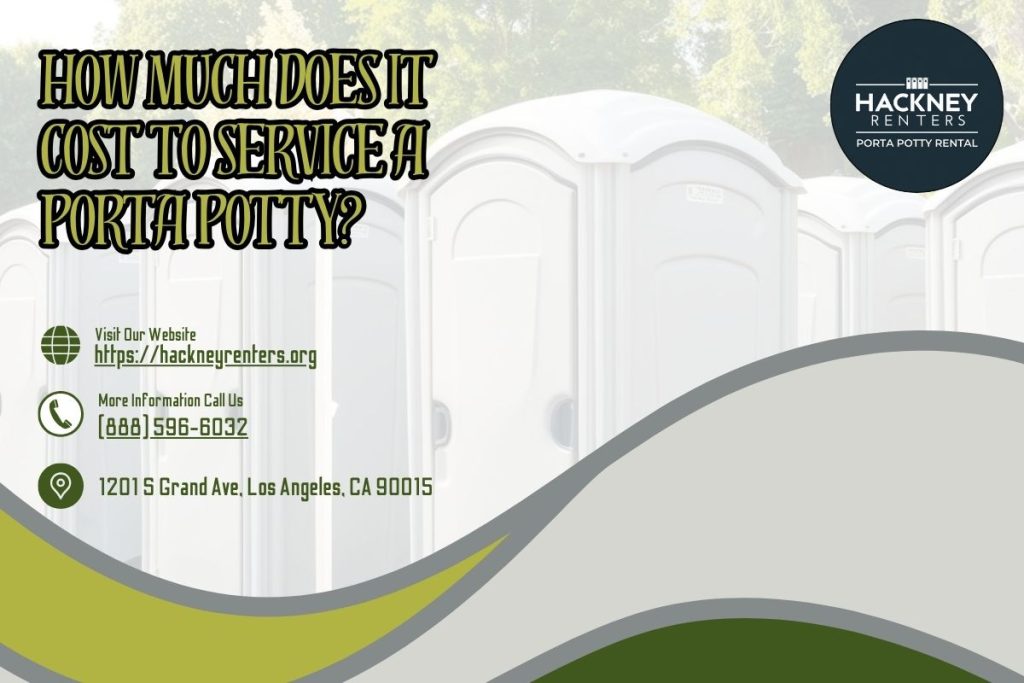Porta potty servicing costs range from $75 to $200 per unit, depending on your specific needs. You'll pay $75-$95 for basic waste removal, $100-$125 for improved cleaning, and $130-$150 for high-volume servicing. Location accessibility greatly impacts pricing—rooftop installations cost 40-60% more, while remote sites add 20-35%. Emergency callouts command premium rates of $125-$200. Supply restocking adds $8-15 per service. Strategic scheduling and bundled agreements can reduce your total expenses by 15-20% through optimized service intervals and volume discounts.

When determining porta potty servicing costs, several key variables directly impact your final expense.
Location accessibility greatly affects pricing—remote or difficult-to-reach sites require specialized equipment and increased labor time.
Service frequency creates cost variations, with weekly maintenance differing considerably from bi-weekly or monthly schedules.
Unit type influences pricing structure. Standard units cost less to service than ADA-compliant models or luxury restroom trailers, which require specialized cleaning protocols.
Waste volume directly correlates with servicing complexity and disposal fees.
Seasonal demand fluctuations impact pricing, with peak construction and event seasons commanding premium rates.
Geographic factors matter—urban locations typically offer competitive pricing due to route efficiency, while rural areas may incur distance surcharges.
Additional services like hand sanitizer refills, deodorization upgrades, or emergency cleanouts create variable cost components beyond standard maintenance protocols.
See also: portable restrooms for rent
Standard porta potty servicing follows a weekly cleaning and pumping schedule that balances sanitation requirements with cost efficiency.
You'll find this frequency works for most standard applications, but high-traffic events demand more aggressive maintenance cycles.
Your servicing frequency directly impacts your bottom line through these cost considerations:
You can optimize costs by monitoring usage patterns and adjusting schedules accordingly.
Smart sensors and IoT technology now enable data-driven servicing decisions, eliminating guesswork while maintaining sanitary conditions.
This precision approach reduces unnecessary service calls while preventing costly overflow situations.
Strategic unit placement directly affects your servicing costs, with accessible locations reducing labor time by up to 30% compared to challenging sites. You'll save considerably when units are positioned near vehicle access points versus remote installations requiring specialized equipment or extended pump hose runs.
| Location Type | Access Difficulty | Cost Impact |
|---|---|---|
| Street-level, vehicle accessible | Low | Base rate |
| Rooftop installations | High | +40-60% |
| Underground/basement areas | Very High | +60-80% |
| Remote construction sites | Medium | +20-35% |
Distance from your service vehicle matters—every further 100 feet of hose run adds $15-25 per service. Terrain obstacles like stairs, narrow gates, or soft ground, which require specialized trucks, increase costs. You'll optimize expenses by considering accessibility during initial placement, ensuring clear pathways for efficient servicing workflows.
Most porta potty servicing costs range from $75 to $150 per unit per service, with your final price depending on waste volume, cleaning requirements, and accessibility factors.
You'll encounter four primary pricing tiers that directly impact your operational budget:
Smart contractors reduce costs by scheduling regular maintenance intervals rather than reactive servicing.
You'll lower per-unit expenses through bulk servicing agreements and strategic route planning that enhances technician efficiency.
Emergency and one-time porta potty servicing typically costs $125-$200 per unit, reflecting the premium you'll pay for immediate response and scheduling flexibility.
You'll encounter higher rates because providers must dispatch crews outside their optimized route schedules, increasing operational overhead.
Same-day service requests command the highest fees, often 40-60% above standard pricing. You're paying for resource reallocation, priority scheduling, and potential overtime costs.
Weekend and holiday emergency services push rates to the upper end of this range.
One-time cleanings for special events or construction sites without ongoing contracts do not qualify for volume discounts. However, you'll gain scheduling autonomy and avoid long-term commitments.
Consider bundling multiple units during single visits to reduce per-unit costs while maintaining service flexibility for dynamic project requirements.
When you commit to regular service contracts, weekly porta potty maintenance costs $75-$120 per unit, while monthly service ranges from $45-$85 per unit. These ongoing rates reflect economies of scale and predictable scheduling efficiencies that benefit your budget.
Your service frequency directly impacts four critical cost variables:
Long-term contracts typically offer 15-25% discounts compared to one-time services.
You'll also receive priority scheduling, guaranteed availability during peak seasons, and streamlined invoicing processes that simplify your administrative overhead.
Hidden fees can inflate your porta potty service costs by 20-40% beyond base rates if you're not vigilant about contract terms.
You'll encounter delivery charges for remote locations exceeding standard service zones, typically $25-75 per unit. Damage fees range from $50 to $500 depending on repair complexity. Weekend or holiday service premiums contribute 25-50% to standard rates. Fuel surcharges fluctuate with market conditions, potentially adding $10-30 per service call.
Lock installation, hand sanitizer refills, and deodorizer upgrades generate supplementary line items. Contract modification fees apply when you adjust service frequency or unit quantities mid-term. Emergency service calls cost 2-3 times regular rates.
Review service agreements thoroughly, negotiate caps on variable charges, and establish clear damage assessment protocols to maintain predictable operational costs.
Because urgent sanitation needs don't follow business schedules, you'll pay premium rates for emergency or same-day porta potty service that typically run 200-300% above standard pricing.
Emergency service fees reflect the operational complexity of rapid deployment:
Same-day requests activate premium pricing structures because they bypass cost-efficient batch processing systems.
You're fundamentally purchasing priority access to limited resources. Smart contractors build buffer capacity, but emergency activation still triggers surcharges ranging from $150-400 above base service rates, depending on distance, timing, and resource availability.
While basic servicing covers waste removal and cleaning, restocking supplies and deodorizing products constitute separate line items that directly impact your total service costs.
You'll pay $8-15 per service for toilet paper, hand sanitizer, and urinal blocks. Premium deodorizing chemicals add $5-12, depending on formula strength and environmental requirements.
Smart procurement strategies reduce these recurring expenses. You can negotiate bulk supply rates when managing multiple units or extended rental periods.
Advanced bio-enzymatic deodorizers cost more upfront but deliver superior odor control and longer effectiveness intervals.
Supply frequency depends on usage patterns and unit capacity. High-traffic locations require weekly restocking, while low-usage sites extend to bi-weekly schedules.
You'll optimize costs by matching supply intervals to actual consumption data rather than standardized service packages.
Strategic cost management transforms porta potty servicing from a fixed expense into an optimized operational component.
You'll enhance efficiency by implementing data-driven maintenance protocols that reduce unnecessary service calls while maintaining hygiene standards.
Consider these cost-reduction strategies:
You'll achieve sustainable cost reductions by treating servicing as a strategic operation rather than reactive maintenance, ultimately improving your bottom line through systematic efficiency improvements.
Although service frequency varies by location and usage, establishing consistent maintenance schedules reduces operational costs by 15-20% compared to reactive servicing models.
You'll enhance your budget by implementing predictive scheduling based on usage patterns and environmental factors. High-traffic locations require bi-weekly servicing, while standard installations need weekly maintenance.
Smart scheduling prevents emergency service calls that cost 40-60% more than routine visits. You can utilize digital tracking systems to monitor waste levels, chemical depletion, and structural wear patterns.
This data-driven approach eliminates unnecessary services while preventing costly overflows or equipment failures.
Batch scheduling multiple units in geographic clusters reduces travel costs and improves technician efficiency.
You'll achieve consistent service quality while minimizing per-unit maintenance expenses through strategic route planning and standardized maintenance protocols.
Beyond optimizing maintenance schedules, you'll improve cost efficiency by integrating servicing directly into your rental contracts. Bundled agreements eliminate variable pricing uncertainty while streamlining operational workflows.
Strategic bundling delivers measurable advantages through consolidated service structures:
You'll secure better rates through long-term commitments while vendors gain revenue predictability. This symbiotic relationship drives innovation in service delivery methods and technology integration.
Smart bundling transforms variable expenses into strategic investments, positioning your operations for sustainable growth while maintaining premium sanitation standards.
If you're responsible for damage during servicing, you'll typically face repair costs ranging from $50 to $500, depending on the severity of the damage. We'll assess damage immediately, provide transparent pricing, and implement efficient replacement protocols to minimize downtime.
You'll receive thorough porta potty servicing during weekends and holidays through our advanced scheduling system. We've streamlined operations to guarantee consistent maintenance coverage, though premium rates apply for holiday service calls to offset increased operational costs.
You can remain present during our streamlined servicing process, though we'll complete maintenance more efficiently when you're not nearby. Our technicians follow optimized protocols that minimize disruption while maximizing cost-effectiveness and sanitation standards.
We'll use EPA-approved biocides, enzyme-based waste digesters, and color-coded disinfectants during your service. You'll benefit from our advanced sanitization protocols that eliminate pathogens while reducing environmental impact, ensuring cost-effective maintenance cycles.
You'll complete standard porta potty servicing in 8-12 minutes using our streamlined protocol. This efficient timeframe covers waste pumping, tank refilling, sanitizing, restocking supplies, and exterior cleaning—optimizing labor costs while maintaining premium service standards.
